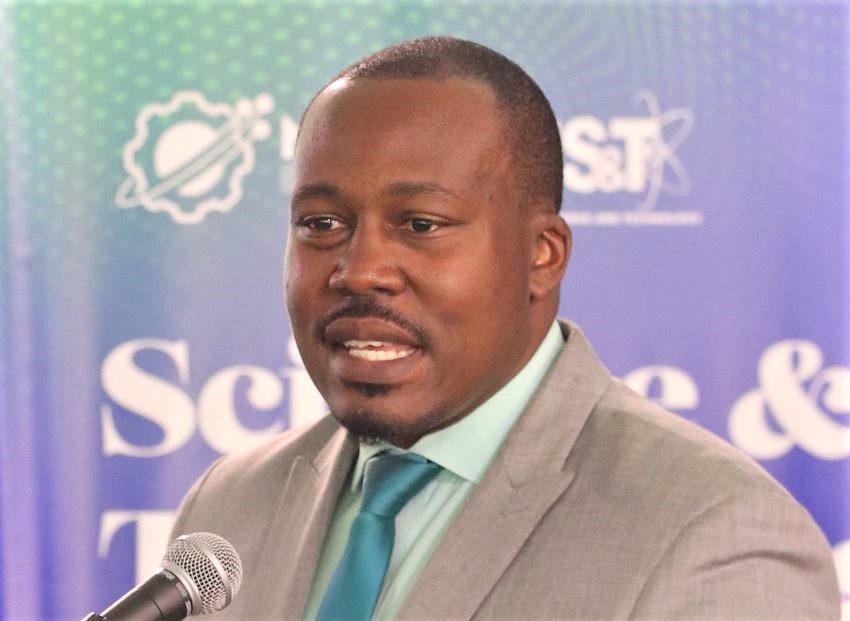
Message from the Honourable Davidson I. Ishmael, J.P., M.P., Minister of Industry, Innovation, Science and Technology in recognition of World Telecommunication and Information Society Day May 17, 2023.
Theme: “Empowering the least developed countries through information and communication technologies”
Every year on May 17, World Telecommunication and Information Society Day is celebrated. That date marks the anniversary of the International Telecommunication Union (ITU), which was founded on May 17, 1865 when the first International Telegraph Convention was signed in Paris.
The theme for 2023 is Empowering the least developed countries through information and communication technologies. Indeed, all efforts should be made to ensure that territories so defined, are empowered as this would even the playing field, to allow them to actively participate in global discussions that will significantly impact their social, economic, political, and environmental landscapes.
The issues confronting the world’s least developed countries (LDCs) are well known – many of them are constrained by limited economic activity, in concert with a scarcity of both financial and highly trained human resources. These issues are further exasperated by a lack of information and communication technologies (ICTs), thus, deepening the digital divide.
The advent of the COVID-19 pandemic resulted in many of these countries having to redirect already limited resources, to focus on healthcare to safeguard their populations. As a result, many of the LDCs are facing daunting challenges mid-way through their desired agenda, to fulfil the United Nations (UN) Sustainable Development Goals (SDGs) by 2030.
By now, we should recognise that all the challenges that the world has encountered in the last decade, will only be conquered and overcome, once we work together. To this end, the LDCs are still considered the world’s greatest untapped resource, whose needs must be addressed in order to achieve the SDGs.
Appropriate access to information and communication technologies (ICTs), will greatly assist in the eradication of poverty, drive education and create employment opportunities as populations would have access to information, build knowledge and skills thus allowing them to contribute to their own personal advancement and to national development.
The ITU has implemented a number of initiatives all aimed at addressing the global challenges faced, particularly by the most vulnerable countries. Some of these initiatives include, inter alia, “The partner2connect (P2C) Digital Coalition” a multi-stakeholder alliance launched by ITU in close cooperation with the Office of the Secretary-General’s Envoy on Technology, the UN Office of the High Representative for the Least Developed Countries, Landlocked Developing Countries and Small Islands Developing States (UNOHRLLS), and in line with the UN Secretary-General’s Roadmap for Digital Cooperation.
The P2C Digital Coalition fosters meaningful connectivity and digital transformation globally, with a focus on, but not limited to, the hardest-to-connect communities in Least Developed Countries (LDCs), Landlocked Developing Countries (LLDCs) and Small Island Developing States (SIDS). There is also ‘Giga’ which is a joint initiative by the ITU and UNICEF. This aims to connect every school to the internet by 2030.
Today, the world stands only seven years away from the current timeline within which we are to achieve the SDGs. Public, private, and public-private investments need to be realised to ensure that LDCs can accelerate their social, economic and environmental development.
Recognising the importance of having access to information and communication technologies, the Government of Barbados has embarked on an ambitious Digital Transformation programme which, when fully executed, will result in timelier and more efficient services being offered to all residents, businesses, and visitors to Barbados. It is envisaged that this will lead to improvements in the ease of doing business and, therefore, increased investment opportunities.
Certainly, and in support of the Digital Transformation agenda, the Ministry of Industry, Innovation, Science and Technology (MIST), has been working assiduously in examining the current digital infrastructure and identifying workable digital solutions. Furthermore, it is intended during this year that continued work will be done to further enhance and harden our infrastructure with respect to our cyber security systems, and data protection.

The Ministry continues to work in tandem with the telecom sector providers and other ICT stakeholders, to improve the quality of life for all. To date service providers have implemented ‘Fiber to The Home’ across the landscape to provide a truly digital ‘Internet backbone’ in Barbados made up of 100% fibre to homes, as well as to micro, small, medium, and large businesses.
Digital online transactions between the Government, the private sector, the Third Sector and the public have already started. Initiatives like the Government’s online payment platform (EZPay+), enable online payments for or to: land tax; the Corporate Affairs and Intellectual Property Office (CAIPO); subscriptions to the Official Gazette; NIS contributions; professional licenses; telecommunication licenses; the Police Certificate of Character; International Business; Civil Aviation; driver’s licenses; TAMIS; the Office of Insolvency; and school fees.
As more services become accessible online, this will lead Barbados becoming a fully interconnected country for commercial, governmental, social and political sustainability. Shortly, there will be an introduction of an Electronic Document and Records Management System (EDRMS), which will aid in the transformation of the Public Service from using paper-based document management, to embracing electronic document management.
Our government is equally cognizant of the importance of equipping our population with the requisite skills and knowledge to be able to make the most of a more digitally-enabled Barbados. Therefore, opportunities are being offered for both children and adults to participate in training – whether through established certified training and educational institutions – and, or through the Government’s National Transformation Initiative (NTI).
Mentorship programmes have also been developed and initiatives that allow for game development, and others which focus on science, technology, engineering, art and mathematics (STEAM), all go a long way to stimulate our youth to think critically and to be innovative.
The ministry that I have the honour to lead, will continue to play its part in the achievement of a fully, digitally transformed environment and to contribute to ensuring that Mission Barbados is realised by 2030. By doing this, Barbados would indeed be fit for purpose economically, socially, and politically and it will be stimulated to provide seamless, easy access to services – providing sustainable growth in all sectors of the economy and improving our lifestyles and our collective prosperity.
As we join with the rest of the globe on May 17, to commemorate World Telecommunication and Information Society Day, I implore all Member States of the ITU to stand in solidarity with the least developed countries – to contribute where appropriate, in order that these countries can improve their ICT infrastructure, so that they may realise a better quality of life for their populations.
